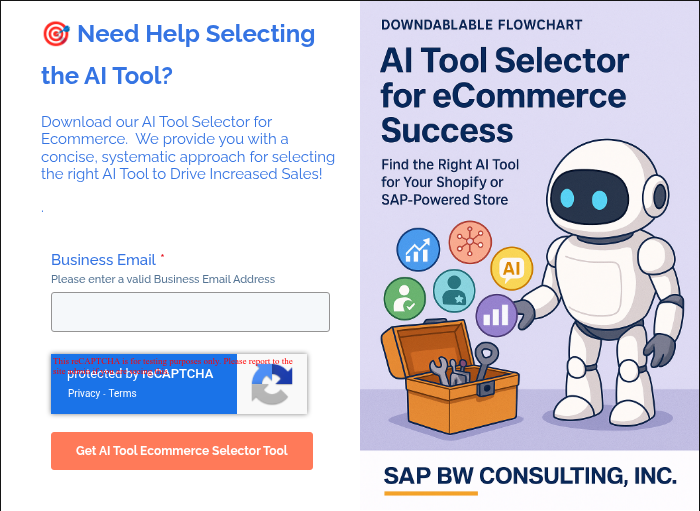AI tools are changing the game for ecommerce businesses. These smart technologies help online stores automate tasks, sell more, and improve customer engagement. If you operate an ecommerce business, you need to know about the powerful artificial intelligence tools that can elevate your operations.
This guide explores the top AI tools for ecommerce, explaining how they work and why they are so valuable. We will cover everything from an AI-powered chatbot to personalized product recommendations that drive sales. You'll gain a clear picture of how AI helps businesses grow and succeed in a competitive market.

Here's a quick overview of the AI tool categories we'll be covering.
| AI Tool Category | Primary Function | Key Business Benefit |
|---|---|---|
| AI-Powered Chatbots | Automate customer communication. | 24/7 customer support and improved customer satisfaction. |
| Personalized Recommendations | Suggest relevant products to shoppers. | Higher conversion rates and average order value. |
| Visual Search | Allow searches using images instead of text. | Enhanced shopping experience and easier product discovery. |
| Inventory Management | Forecast demand and manage stock levels. | Reduced carrying costs and prevention of stockouts. |
| Price Optimization | Set optimal product prices automatically. | Maximized profit margins and competitive pricing. |
| Fraud Detection | Identify and block fraudulent transactions. | Reduced financial loss and increased security. |

1. AI-Powered Chatbots
A conversational AI chatbot acts as a digital assistant for your online store. This AI tool uses natural language processing (NLP) to understand and respond to customer inquiries in real time. This means your customers can get instant help with their questions 24/7, improving the overall customer experience.
Effective chatbots handle common tasks like tracking orders, answering frequently asked questions, and helping users find products. This automation frees up your human customer support agents to focus on more complex issues. When a problem is beyond their scope, chatbots can seamlessly escalate the conversation to a human, ensuring the customer always gets the help they need.
The best chatbots learn from user interactions, continuously improving their responses. This learning process, driven by machine learning algorithms, makes them more effective over time. Implementing an AI-powered chatbot can lead to faster response times, increased customer satisfaction, and higher operational efficiency.
Some popular chatbot options for ecommerce include:
- Zendesk Answer Bot
- Intercom
- MobileMonkey
.png?width=2160&height=2268&name=Boost%20Your%20Sales%20with%20AI%20Tools%20for%20Ecommerce%20-%20visual%20selection(1).png)
2. Personalized Product Recommendations
Artificial intelligence excels at analyzing customer data to offer personalized product recommendations. This technology examines past purchases, browsing history, and items left in carts to suggest other products a customer might like. It acts like a smart digital salesperson who understands individual customer preferences.
These personalized recommendations can appear on your homepage, product pages, or within email marketing campaigns. They help customers discover products they might not have found on their own, which can significantly increase your conversion rate. This personalized approach makes the shopping experience feel more individual and relevant.
The AI algorithms behind these systems process vast amounts of customer behavior data to identify patterns. By showing the right product to the right person at the right time, you can boost sales and foster customer loyalty. This is a powerful marketing tool for any ecommerce business looking to grow.
Some tools that offer personalized product recommendations include:
- Nosto
- Dynamic Yield
- Clerk.io
.png?width=1926&height=1872&name=Boost%20Your%20Sales%20with%20AI%20Tools%20for%20Ecommerce%20-%20visual%20selection(2).png)
3. Visual Search
Visual search technology allows customers to find products by uploading an image. AI analyzes the visual information in the picture and searches your inventory for similar items. This functionality is particularly useful for ecommerce businesses in the fashion, home decor, and beauty industries, where aesthetics are very important.
For instance, a customer could upload a photo of a handbag they saw on social media. The AI technology would then display similar handbags available in your store, simplifying the customer journey. This makes the shopping experience more intuitive and enjoyable, reducing the friction of traditional text-based searches.
Implementing visual search can give you a competitive edge and improve customer engagement. It taps into the modern shopper's desire for immediate, visually driven results. When considering a visual search tool, look for one with a high degree of accuracy and seamless integration with your ecommerce platform.
Some visual search tools to check out:
- Syte
- ViSenze
- Slyce
.png?width=2664&height=1836&name=Boost%20Your%20Sales%20with%20AI%20Tools%20for%20Ecommerce%20-%20visual%20selection(3).png)
4. Inventory Management
AI can revolutionize how you handle inventory management. Predictive analytics, powered by AI, can forecast which products will be in high demand and when. This data-driven approach helps ecommerce businesses avoid stockouts of popular items or overstocking products that sell slowly.
By optimizing your supply chain, AI helps you maintain the right amount of stock at all times. This reduces carrying costs and minimizes lost sales due to unavailable products. Efficient inventory management is crucial for profitability and maintaining high levels of customer satisfaction.
AI systems analyze historical sales data, market trends, seasonality, and even promotional events to make accurate predictions. This leads to increased efficiency and a more resilient supply chain. These advanced analytics provide actionable insights that manual processes simply cannot match.
Some AI-powered inventory tools include:
- Relex Solutions
- Blue Yonder
- Increff
.png?width=2304&height=2196&name=Boost%20Your%20Sales%20with%20AI%20Tools%20for%20Ecommerce%20-%20visual%20selection(4).png)
5. Price Optimization
Setting the right prices is a constant challenge for any ecommerce business. Price too high, and you risk losing customers; price too low, and you erode your profit margins. AI can help you implement dynamic pricing strategies to find the perfect balance.
Price optimization tools use AI algorithms to conduct extensive data analysis. They monitor market trends, competitor pricing, demand fluctuations, and your own sales data. Based on this information, the AI marketing tool suggests optimal prices for your products to maximize revenue and profit.
This technology allows for pricing based on real-time conditions, not just static rules. Some advanced features include setting custom pricing for different customer segments or regions. Using AI for your pricing strategies helps your business stay competitive and profitable.
Some price optimization tools to consider:
- Competera
- Prisync
- Intelligence Node
.png?width=3132&height=1693&name=Boost%20Your%20Sales%20with%20AI%20Tools%20for%20Ecommerce%20-%20visual%20selection(5).png)
6. Fraud Detection
Online fraud is a significant threat to ecommerce businesses, leading to chargebacks and lost revenue. AI-powered fraud detection systems can identify and block suspicious activity before a transaction is completed. These systems analyze numerous data points, including unusual purchase patterns, IP locations, and mismatches between shipping and billing information.
Unlike rule-based systems, AI and deep learning models can detect new and sophisticated fraud tactics by identifying subtle anomalies in user behavior. This proactive approach helps businesses reduce financial losses. A reliable fraud detection tool also protects legitimate customers and builds trust in your brand.
By automating the detection process, AI helps your team work more efficiently, reviewing only the highest-risk transactions. The potential ROI from preventing just a few large fraudulent orders can be substantial. These AI tools are essential for securing your ecommerce platform.
Some AI-powered fraud detection tools:
- Signifyd
- Riskified
- Sift
.png?width=1985&height=1764&name=Boost%20Your%20Sales%20with%20AI%20Tools%20for%20Ecommerce%20-%20visual%20selection(6).png)
7. Customer Service AI
Beyond chatbots, AI can augment your entire customer service operation. An AI tool can intelligently sort and prioritize incoming customer support tickets, ensuring urgent issues are addressed first. It can also analyze the content of a message and suggest relevant replies to your human agents.
This kind of support allows your customer service team to handle inquiries faster and more consistently. By automating routine tasks, AI lets your staff concentrate on resolving complex problems that require a human touch. This blend of automation and human expertise leads to a better overall customer experience.
Many customer service platforms now incorporate AI to provide advanced analytics on performance data. These insights can help you identify common pain points in the customer journey and improve your products or services. Ultimately, a strong customer service AI helps you boost customer satisfaction and loyalty.
Some customer service AI tools to look at:
- Gorgias
- Freshdesk
- Zendesk
.png?width=3096&height=3402&name=Boost%20Your%20Sales%20with%20AI%20Tools%20for%20Ecommerce%20-%20visual%20selection(7).png)
8. SEO and Content Creation
AI is transforming SEO and content creation for ecommerce businesses. AI marketing tools can analyze search engine trends and suggest high-value keywords to target. They can also optimize your product descriptions to improve your rankings and attract more organic traffic.
Generative AI can assist with content generation for blogs, social media posts, and ad copy, helping you execute your marketing strategies more efficiently. For example, a tool like Surfer AI helps you create content that is optimized to rank on the first page of search results. This saves time and resources while scaling your content creation efforts.
Using AI for SEO ensures your product data and descriptions are clear, compelling, and aligned with what customers are searching for. Better visibility on a search engine leads directly to more site traffic and a higher conversion rate. A good AI tool provides training resources to help you get the most out of its features.
Some AI tools for SEO and content:
- Frase
- MarketMuse
- Clearscope
.png?width=1944&height=1872&name=Boost%20Your%20Sales%20with%20AI%20Tools%20for%20Ecommerce%20-%20visual%20selection(8).png)
9. Email Marketing Automation
AI brings a new level of sophistication to email marketing. AI-powered marketing automation platforms can analyze customer behavior to create highly targeted audience segments. This allows you to send personalized marketing campaigns that resonate with each recipient.
This AI marketing tool can determine the optimal time to send an email to an individual subscriber for the highest open and click-through rates. It can also personalize email content dynamically, showing different product recommendations or offers based on past interactions. This level of personalization significantly improves customer engagement.
By automating these complex tasks, you can run more effective marketing campaigns without a steep learning curve. The actionable insights provided by the AI can help you continuously refine your strategy for better results. This technology makes email marketing a more powerful tool for driving repeat business.
Some AI-powered email marketing tools:
- Klaviyo
- Omnisend
- Drip
.png?width=2880&height=3204&name=Boost%20Your%20Sales%20with%20AI%20Tools%20for%20Ecommerce%20-%20visual%20selection(9).png)
10. Return Prediction
Product returns are a costly and logistical challenge for ecommerce platforms. AI can help mitigate this issue by using predictive analytics to identify which products are most likely to be returned. The system can also pinpoint which customers are most likely to make returns.
The AI models analyze historical return data, product attributes, and customer feedback to make these predictions. With this information, you can take proactive steps, such as improving a product description or adding more images to clarify sizing. This helps customers make more informed purchase decisions, reducing the likelihood of a return.
By lowering your return rate, you save money on reverse logistics and restocking. You also improve customer satisfaction by ensuring buyers receive a personalized product they are happy with the first time. This is a strategic use of AI that directly impacts your bottom line.
Some return prediction tools to consider:
- Returnly
- Narvar
- ReturnLogic
.png?width=1728&height=1512&name=Boost%20Your%20Sales%20with%20AI%20Tools%20for%20Ecommerce%20-%20visual%20selection(10).png)
Conclusion
AI tools for ecommerce are fundamentally reshaping how online stores operate. From automating customer support with chatbots to refining marketing strategies with predictive analytics, this technology helps businesses in countless ways. AI can save you time, increase your conversion rates, and improve the overall customer experience.
As you evaluate these ecommerce AI tools, consider your business's most pressing needs. You do not need to adopt every solution at once; start with one or two that address your biggest challenges. You can then integrate more advanced features and tools as your business grows and your needs change.
Remember that AI technology is here to augment your team, not replace it. Use these powerful systems to support your staff and create a better, more efficient shopping journey for your customers. With the right AI tool, your ecommerce business can gain a significant competitive advantage.

We are a full-service Hubspot Certified Inbound Marketing and Sales Agency. In addition, we work to integrate your SAP System with Hubspot and Salesforce, where we have a deep delivery capability based on years of experience. Please our book a meeting service to get started.


